MercoPress. South Atlantic News Agency
Health & Science
-
Friday, July 7th 2017 - 03:32 UTC
Face of the woman who ruled Peru 1,700 Years ago revealed
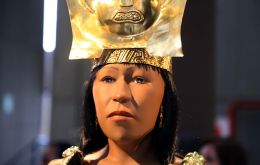
The face of the Lady of Cao, considered to be a queen who ruled northern Peru 1,700 years ago, was revealed on Tuesday thanks to 3D technology developed by private companies, as was a replica of her mummified body, appearing just as it was found in 2005 at the El Brujo archaeological complex.
-
Tuesday, June 6th 2017 - 08:05 UTC
UN opens conference on the health of the world's oceans and seas
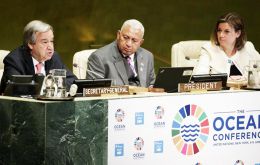
Opening a “game-changing” international conference on the health of the world’s oceans and seas, top United Nations officials urged on Monday coordinated global action to protect the planet. Speaking in the UN General Assembly Hall, Secretary-General Antonio Guterres cautioned Governments that unless they overcome short-term territorial and resource interests, the state of the oceans will continue to deteriorate.
-
Tuesday, June 6th 2017 - 07:33 UTC
“Pink slime” trial: beef plant demanding US$ 5.7bn from ABC for “fake news”

A trial has begun in South Dakota over a meat processer's claim that it was defamed by ABC News reporting that dubbed its product “pink slime”. Beef Products Inc (BPI) argues ABC and its journalist ruined its reputation in 2012 reports on “lean finely textured beef”, as the industry calls it.
-
Wednesday, May 31st 2017 - 06:16 UTC
Falklands Annual Address: a confident community's proud report planning for the future

Falklands' Acting Governor Alex Mitham looks back on the past year of activity for the Falkland Islands Government. The ceremony took place on Tuesday morning at the Court and Assembly Chambers during the Budget meeting of the Legislative Assembly
-
Wednesday, May 31st 2017 - 05:52 UTC
World No Tobacco Day 2017: for health, prosperity, the environment and national development
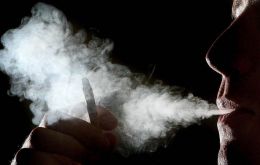
Action to stamp out tobacco use can help countries prevent millions of people falling ill and dying from tobacco-related disease, combat poverty and, according to a first-ever WHO report, reduce large-scale environmental degradation.
-
Wednesday, May 24th 2017 - 09:15 UTC
Dr Tedros Adhanom Ghebreyesus elected next WHO Director General

Members States of the World Health Organization (WHO) on Tuesday elected Dr Tedros Adhanom Ghebreyesus as the new Director-General of WHO. Dr Tedros Adhanom Ghebreyesus was nominated by the Government of Ethiopia, and will begin his five-year term on 1 July 2017.
-
Tuesday, May 23rd 2017 - 13:58 UTC
WMA leader wars about growing violence against physicians and healthcare

A warning about an increase in violence against physicians and a general disrespect for medical and health institutions in both civil and conflict situations has come from the Chair of the World Medical Association Dr. Ardis Hoven.
-
Sunday, May 14th 2017 - 00:03 UTC
UK/Uruguay confirm Antarctic cooperation with Montevideo visit of two BAS research vessels
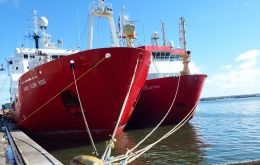
Two British scientific research vessels coincided in Montevideo in early May at the end of the Antarctic season, in their way back to Southampton. Icebreaker RRS Shackleton and RRS James Clark Ross with sophisticated scientific research equipment and tens of experts in different disciplines spent months in Antarctica and returned to Montevideo, a traditional call port the British Antarctic Survey, BAS.
-
Friday, May 12th 2017 - 12:09 UTC
Nurse leadership vital for World Health Organization

With more than 20 million nurses and midwives making up almost half of the entire global health workforce, Dr David Nabarro, candidate for Director-General of the World Health Organization (WHO) has pledged his support for increasing nurse leadership at WHO.
-
Wednesday, May 10th 2017 - 06:44 UTC
Venezuela health crisis: sharp rise in infant mortality and maternal death rates
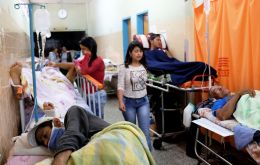
There has been a sharp rise in infant mortality and maternal death rates in Venezuela. In the first figures released for two years, the Health Ministry said the number of women dying in childbirth was up by 65%, while child deaths were up 30%. There has also been a jump in illnesses such as malaria and diphtheria.